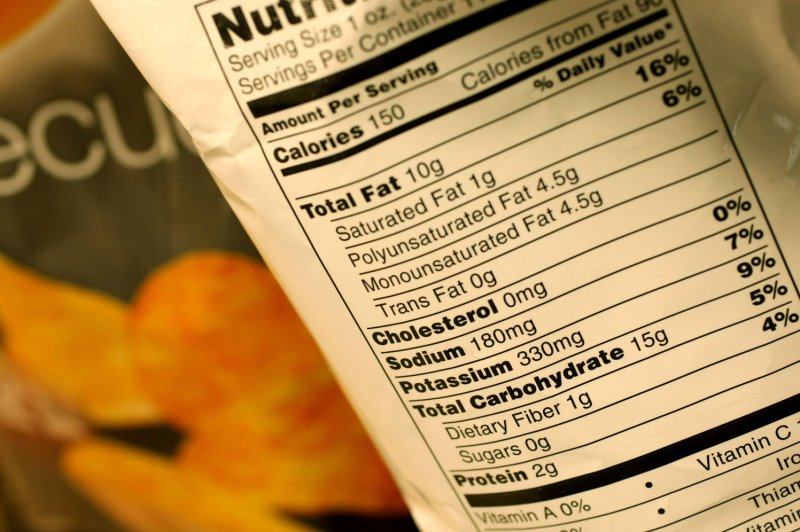The Food and Drug Administration wants Americans to reduce their salt consumption, and be more aware of what they eat, as part of its aggressive healthy-eating agenda. File Photo by Monika Graff/UPI |
License Photo
March 29 (UPI) -- The Food and Drug Administration is pushing a strategy to reduce salt across the food supply in a multi-pronged agenda to promote healthy eating.
FDA Commissioner Scott Gottlieb outlined the agency's plans in a speech Thursday morning at the National Food Policy Conference in Washington, D.C., focusing on efforts to reduce salt consumption. He also offered updates on plans for better information on food packages and the how the FDA is looking for ways to clarify ingredient lists on the packages.
The speech follows an announcement last Thursday outlining a similar policy on tobacco. The healthy food agenda he discussed today builds on efforts by former President Barack Obama and first lady Michelle Obama.
"Like our efforts to reduce tobacco use, our work in nutrition can do much to reduce the burden of chronic disease and the early death we see as a result of avoidable illness," Gottlieb, who took over as FDA commissioner last May, told the attendees. "It can also help to break cycles of poor health, poor educational attainment, and complications from chronic disease that exacerbate burdens of illness and risk fracturing society along socioeconomic lines."
The FDA, which regulates 80 percent of the U.S. food supply, is taking direct aim at salt consumption.
"There remains no single more effective public health action related to nutrition than the reduction of sodium in the diet," Gottlieb said. "Excess sodium in the diet results in hypertension, which increases the risk of strokes and heart attacks."
He noted that reducing sodium intake by one-half teaspoon a day could prevent nearly 100,000 premature deaths a year, as well as 120,000 new cases of coronary heart disease, 66,000 strokes and 99,000 heart attacks.
"And, certain segments of our population such as African Americans are at greater risk for hypertension and develop it at earlier ages," he noted. "I'm committed to advancing the short-term voluntary sodium targets."
The FDA, he said, has proposed short-term, voluntary targets for sodium reduction in foods of 3,000 milligrams per day from the current average intake of more than 3,400 milligrams.
"We intend to align our approach with the Dietary Reference Intake that's being conducted by the National Academies," he said. "I believe we can build broad support for our approach."
Gottlieb said the FDA would update its voluntary short-term sodium targets in 2019.
In 2016, the Obama administration unveiled draft voluntary reduction targets to cut back on salt in nearly 150 food categories, including frozen pizza, snack foods and canned olives.
Americans' addiction to salt may be waning, according to a survey of more than 172,000 households found between 2000 and 2014.
In that timespan, the salt content of packaged foods consumers purchased decreased 12 percent and the amount of salt in the packaged food and drinks people bought was reduced by nearly 400 mg a day -- dropping from more than 2,300 mg to less than 2,000 mg a day.
The FDA also is considering changing labeling so consumers know that they are consuming salt.
"We've been petitioned to allow the use of alternative names for 'potassium chloride' -- to make it clear that this product is a salt -- and we're actively considering this request," Gottlieb said.
Gottlieb said the concept may extend to other ingredients, such as using "vitamin B6" instead of "pyridoxine" and "vitamin B12" in place of "cyanocobalamin" so that people can "better understand what's in their food."
"Consumers want 'clean labels' that are readable and understandable," he said. "Manufacturers are taking this consumer preference seriously, and FDA has a role here as well. We're considering what changes could make ingredient information more consumer friendly."
The FDA also has decided to keep the Nutrition Facts update promoted by former first lady Michelle Obama after a compliance deadline was delayed 18 months. In January 2020, large food companies will start having to use the new labels that include the disclosure of added sugars and use a bigger font for caloric content.
The FDA also plans to streamline its process for reviewing qualified health claims from the industry to prioritize the ones that are based on the strongest science and could have great effect on public health.
"These claims can show that a food component may reduce the risk of a health-related condition, such as the relationship between folate and the reduction in risk of a child being born with certain birth defects," he said. "One example of how such claims can make a difference is manufacturers' ability to use a qualified health claim linking early peanut introduction in certain infants to a reduced risk of developing a peanut allergy."
Gottlieb said about three-fourths of the U.S. population has a diet that's low in vegetables, fruits, dairy and healthier oils, while also exceeding the recommended daily intake of added sugars, saturated fats and sodium.
He noted that 97 percent of American parents believe that childhood eating habits determine children's health for their lifetime, according to the National Poll on Children's health, but only 17 percent say their child's diet is very healthful. In addition, nearly half of all parents have difficulty determining which foods are actually healthy
"I'm committed to advancing our work in nutrition as one tool to help reduce health disparities, and improve the lives of all Americans, and to help every family live more free from the burden of preventable illness," Gottlieb said.















